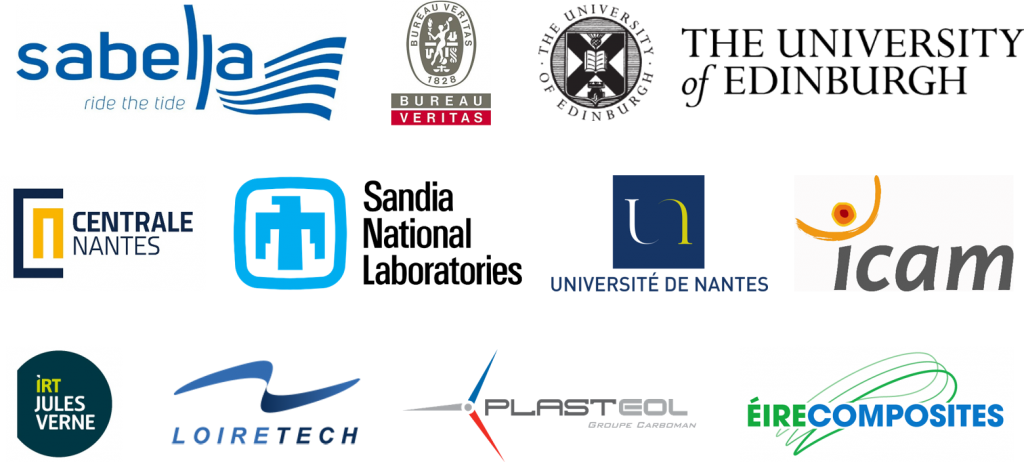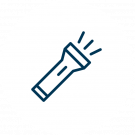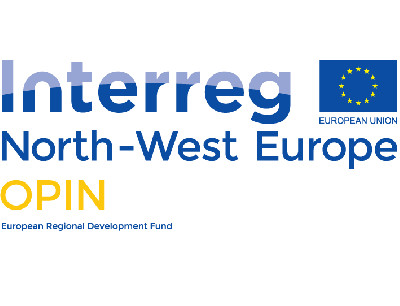
Background
You will find here the synthesis report of the OPIN Workshop “Advanced Materials and Manufacturing (composite focus)” held on 12/11/19 in Nantes, France.
This OPIN Workshop took place as part of the Ocean Power Innovation Network (OPIN). OPIN is a European collaborative network that aims to encourage both cross-sectoral and cross-regional collaboration for Offshore Renewable Energy SMEs and associate partners (research organizations, large companies, public institutions).
Each OPIN workshop covers a specific topic, addressed from different perspectives by speakers from the industry and academic research.
This event was organised by WEAMEC within the OPIN project thanks to the co-funding of Interreg North West Europe and Nantes Métropole.
OPIN Workshop Advanced Materials and Manufacturing (composite focus)
The workshop agenda included:
All presentations are available for download at the bottom of the page.
Introduction
- Introduction to the Ocean Power Innovation Network (OPIN):
OPIN is a European collaborative network that aims to encourage both cross-sectoral and cross-regional collaboration for Offshore Renewable Energy SMEs and associate partners (research organizations, large companies, public institutions). At the end of 2019, the network gathers 150 members from 15 different countries, from Europe and beyond (USA, Canada, India, etc.).
The presentation covered the supports offered to the network members: annual symposium, workshops, masterclasses, Collaborative Innovation Groups and Technology Assessment Process. The next OPIN events were highlighted: a workshop “Ocean Power and the supply chain” in Edinburgh (UK) on 26/02/20 and a masterclass on “Mooring and Installation” in Nantes (France) on 19/03/20.
- Introduction to the WEAMEC ecosystem: Philippe Baclet
WEAMEC federates the Marine Renewable Energy (MRE) ecosystem in Pays de la Loire with a particular focus on Research, Innovation and Education. An overview of WEAMEC ecosystem is provided. WEAMEC brings together around thirty institutions and research laboratories (such as Centrale Nantes, Nantes University, “Jules Verne Research Institute”, EMC2 cluster…) and around sixty companies at the regional level. The skills of these stakeholders, coupled with structuring testing facilities, has led to over 500 Regional, National and European projects for a portfolio of more than 100 M€ for the regional stakeholders over the [2015-2020] period.
As an example, the SEM-REV test site at sea, operated by Centrale Nantes, currently host two devices: the floating offshore wind turbine FLOATGEN (lead partner: IDEOL) and the wave energy convertor IHES (lead partner: GEPS Technology). A focus is made on the call for projects “International Research” funded by WEAMEC, enabling international research projects with collaboration between two laboratories: the first of a research organisation from Pays de la Loire region and the second of an organisation targeted in the International Strategy of WEAMEC.
Applications and needs from the industrial sector
- Sabella: Julie Marcille
Sabella has accumulated a significant experience of tidal energy projects since 2008 when the first tidal turbine (D03) was installed in France. They currently operate the tidal turbine D10-1000 connected to the Ushant island grid since 2015 and enabling to reduce the dependency of the island to diesel generators. The next step is to install two tidal turbines in 2022 within the PHARES project, the first commercial turbines array in France.
During the presentation, Sabella highlighted several challenges for the blades and composite sector including the need to refine the knowledge on real environmental conditions (e.i. turbulences), composite behaviour in underwater environment and ultimately to optimise the safety factors in design standards to reduce blade costs. Other challenges highlighted were the integration of monitoring systems in composite materials through fiber optics and integration of blade fixation directly in the blade roots. To address these topics, Sabella is conducting multiple research activities, in particular the RealTide project including IFREMER and Bureau Veritas.
- Bureau Veritas: Stéphane Paboeuf
Bureau Veritas is a leader company in the test, inspection and certification market, and one of the oldest ship classification society in the maritime sector. The presentation gave an overview of collaborative research projects conducted in the Composite Materials team of Bureau Veritas Marine and Offshore division, such as: RealTide, FabHeli, RAMSSES, FIBRESHIP, etc. These research projects are used to improve guidelines and standards, both the ones published by Bureau Veritas and through participation to the International Electrotechnical Committee (IEC).
A focus is made on the RealTide project and how it will improve the existing guideline NI603 Current and Tidal Turbines. Another focus is made on the FabHeli project and the objective of Bureau Veritas to develop rules for the design assessment of composites propellers (NI663 Propellers in Composite Materials). Finally, a material database is highlighted from the RAMSSES project, in which Bureau Veritas is in charge of developing a “Fast Track to Approval” process for the certification of innovative solutions.
- EireComposites: Brian Mannion
EireComposites is a composites design, manufacturing and testing company particularly involved in the renewables sector for wind and tidal turbines blades. The speaker from Eire Composites had to cancel his venue to the workshop but the presentation, including his contact details, is available for download at the bottom of the page.
Latest news from the academic research
- University of Edinburgh: Dr. Edward McCarthy
The Composites group at University of Edinburgh has developed particular expertise in composite materials manufacturing processes including laser tape placement or advanced powder epoxy composites. Their range of skills covers also the stress analysis for blades design and modelling of impact damage. The speaker from the University of Edinburgh had to cancel his venue to the workshop but the presentation, including his contact details, is available for download at the bottom of the page.
- Centrale Nantes: Prof. Christophe Binetruy
The Processes and Mechanics of Materials research group of the Institute of Civil Engineering & Mechanics (GeM) has strong competencies on the composite manufacturing topic. Their integrated approach to physical models, numerical models and experiments leads to a better understanding and optimization of the manufacturing processes of composites. An overview of the composite manufacturing research topics was presented, including the compaction of dry fabrics, interplies adhesion in composite forming of viscous discontinuous thermoplastic prepregs and fiber washing.
Participation is encouraged to the 19th European Conference on Composite Materials (ECCM19) that will be held in Nantes, France between June 22-26, 2020. ECCM19 is organised by the GeM laboratory (Ecole Centrale de Nantes and Université de Nantes), under the patronage of the European Society for Composite Materials.
- Sandia National Laboratories: Bernadette A. Hernandez-Sanchez
The Materials team of Sandia National Laboratories is particularly involved in composite materials through the US Marine Hydro-Kinetic (MHK) Composites Program. As part of this program, a selection of materials was made in 2017 for further investigation, based on feedback provided by industrial partners. The investigation covered in particular biofouling, the effects of salt water on composite performance, and corrosion on metals connected to carbon fiber composite materials. Tests are conducted at different scales including coupons, sub-scale elements and full-scale components.
This work leads to the U.S. Department of Energy’s MHK Composite Materials & Structures Database, an open source database that includes performance data on composite materials.
- University of Nantes: Alexandre Clément
The Durability of materials (E3M) team of the Institute of Civil Engineering & Mechanics (GeM) has developed skills for the characterization and modelling of coupled hygro-thermo-mechanical behaviour of composites in harsh environment. The team is equipped with testing facilities such as a Dynamical Mechanical Analysis (DMA) instrument for characterization of visco-elastic properties or climatic chambers to operate various tests in hygro-thermal controlled environments.
An overview of the research work done in the STIICPA, FIRMAIN, CEAUCOMP and INDUSCOL projects was presented, followed by research topics to be further investigated in collaborative projects. Among these topics, the speaker highlighted in particular the damage (impact of aging on debonding at the matrix/fiber interface, matrix crack propagation and delamination) and the study of the impact of diffusion cycling on the hygro-elastic behaviour with thermodynamical models.
- ICAM: Eric Le Gal La Salle
After an introduction on the global context of waste reduction, Institut Catholique d’Arts et Métiers (ICAM) gave an overview of composites recycling processes; including grinding, mixing, pyrolysis, combustion and solvolysis; and their advantages and drawbacks.
A focus was made on pyrolysis/solvolysis as a potential recycling solution for carbon fibers and the limits when applied to glass fibers due to the decrease in the mechanical properties. More generally, ICAM highlighted how recycled glass fibers are currently uncompetitive with virgin glass fibers which have a lower cost and equal or better properties.
Finally, the presentation addressed thermoplastics recyclability with the example of a thermoplastic resin that can be recovered by heat-depolymerization with the same mechanical properties as the virgin resin. Nevertheless, attention should be paid to the recovered fibers that are shorter, more fragile and more difficult to handle than virgin fibers, and the need to ensure a correct fibers alignment to ensure good mechanical properties.
Manufacturing and cross-sector considerations
- IRT Jules Verne : Philippe Le Bot, Marie Weiss, Bertrand Lascoup
IRT Jules Verne is an industrial research institute dedicated to advanced manufacturing technologies, including composites manufacturing processes. An overview of the composites research activities was provided, covering high rate lay-up processes, complex preforms (ex: hollow tidal turbine blade manufactured in the HOBIT project), composite forming, multi-material structures design and assembly, and process control. The associated manufacturing and test equipment was presented, such as the automated Non-Crimp Fabric & Unidirectional lay-up and forming line, the thermoset injection machine or the high dimension fatigue device. The workshop attendees participating to the IRT Jules Verne technical visit at the end of the day could see a selection of this equipment.
Finally the European activities of IRT Jules Verne were introduced, highlighting the lobbying activities in multiple European committees, the construction of collaborative R&D projects proposals, involvement and management of the granted projects (ex: RAMSSES, Repair 3D, FORTAPE, etc.), and links with other regional initiatives.
- LoireTech : Franck Bourcier
LoireTech offers innovative and sustainable tooling solutions for large and complex composite, thermoplastic and metallic parts, from forming or moulding to inspection operations. The presentation gave an overview of collaborative research projects on composites, such as: WALID (thermoplastic wind turbine blade), HOBIT (hollow tidal turbine blade), Cooling tower blade and FAbHeli (composite propulsion blade).
The speakers highlighted the need to involve end-users and build application projects to follow-up on these activities. Attention was drawn on the blade manufacturing relocation in Asian countries and the need for European manufacturers to be technically excellent or to focus on innovative concepts to stay competitive. The workshop attendees participating to the LoireTech technical visit at the end of the day could see the manufacturing facility.
- Plastéol : Pierre Le Joubioux
The presentation from PLASTEOL, a subsidiary of the CARBOMAN group, focused on repair and maintenance activities for onshore wind turbine blades. An overview of typical activities for preventive and corrective blade maintenance was provided, including blades cleaning, first skin reconstruction and blade tip repair.
A critical point for the maintenance team is the frequent lack of information on the composite material to be repaired. Therefore PLASTEOL has developed non-destructive control and damage areas analysis tools (type of fabric, number of ply, thickness of each ply) to repair identically the blade and maintain the same mechanical properties.

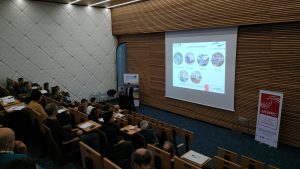
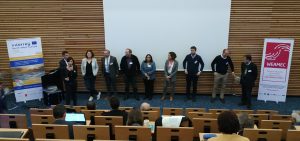
Highlights of this OPIN Workshop
- 30 participants: industrials, academics, start-up, etc. from France and beyond (UK, USA)
- 11 speakers:
